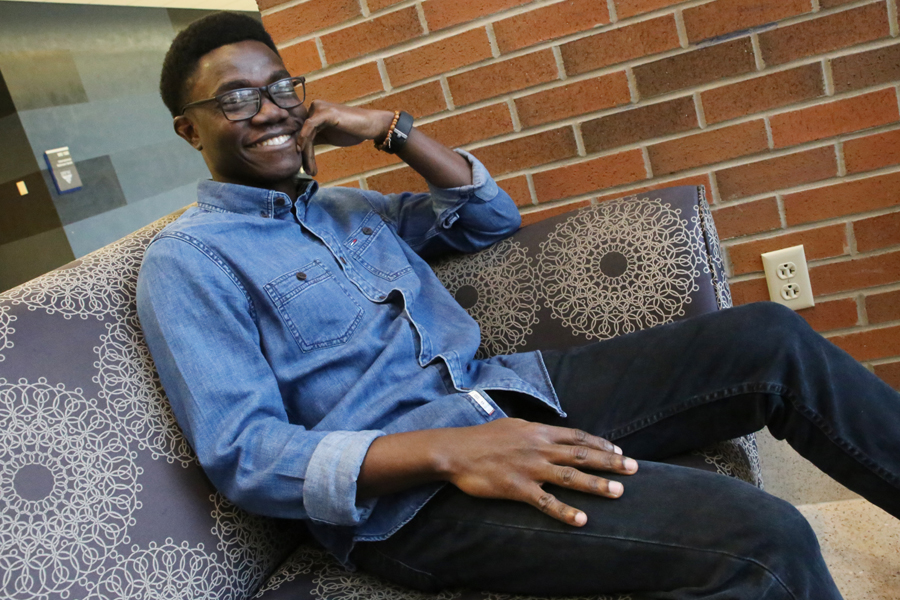Nigerian Phillip Ottah GOT WORDS

Emoghene (pronounced Emo-gen-nay) Phillip Ottah
Ottah and the Nigerian Pidgin Language Spoken in West Africa
Phillip Ottah, IPFW graduate student, is a soft-spoken brother when you first meet him, or when you stick an audio recorder in his face and ask him to explain his Pidgin language.
When he’s in his classroom, where he can own the room and drop knowledge about information technology and advanced computer application, “I speak up. I’m very loud.”
His full name is Emoghene (pronounced Emo-gen-nay) Phillip Ottah (pronounced Uh-ta).
“I find that a lot of Americans find it difficult to pronounce my first name, or even remember my first name, so I give them something they can easily recall.” He goes by Phil.
Ottah is from Delta State in Nigeria, an area of the country rich in oil and agriculture production. “In my state, we have different groups with different languages,” Ottah said.
Urhobo is his native language; the region, however, is so diverse that many of its denizens speak multiple languages. “It would be just like living in Northern and Southern Indiana with those groups having different languages in the same state.”
English, “the accepted language in Nigeria,” Ottah said, is actually taught in school. But learning the language in a traditional way is not an option for an uneducated Nigerian, according to Ottah.
In order to navigate the cacophony of 200+ languages, while retaining ties to the preferred English language, Nigerians, just like other diverse groups in the world, use Pidgin language.
Nigerian Pidgin isn’t taught in school, but its use is so prevalent it might as well be. According to a 2015 CNN report, Pidgin, a version spoken in Hawaii for decades, is now listed as one of the official languages in the islands.
“Pidgin is the language that unifies everyone, using English words but with a different context or different meaning,” Ottah said.
For example:
I want to go to the movies in English can translate to I wan go watch movie.
Are you leaving now? can translate to You don-de move?
I’m really hungry can translate to I day h die. “When you use ‘die’ [in that sentence], it points out the severity of how hungry you are,” Ottah said.
Sometimes the translation from English to Pidgin is phonetic (sound) based, and sometimes the translation is akin to a writer rephrasing or refining a statement.
You’re looking good can translate to You make sense.
Ottah learned Pidgin as a kid, but has been away for eight months. Pidgin is so dynamic, according to Ottah, “if I were to go back now, I would probably be out of touch with some of the new vocabulary generated after I left.”
Some vocab words can fall so far out of favor, becoming obsolete, that Ottah, if back home, would have to ask the meaning of what was just spoken to him.
Ottah is working on his second Master’s degree. His first Master’s (and his Bachelor’s) is in Mechanical Engineering, received at the University of Benin in Nigeria. But he wanted a bigger challenge, in a field “that was fast growing.”
He teaches Mechanical Engineering Technology at IPFW while studying the previously-mentioned advance computer application and information technology, which is kind of a catch-all degree, comprised of diverse areas like computer science and cyber security. Emoghene Phillip Ottah is basically studying to be a computer linguist. He will complete his degree in 2020.

